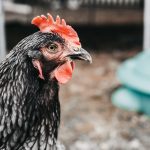Daisy is a passionate advocate for sustainable living and has taken up the hobby of chicken-keeping as a way to contribute to her local community and reduce her environmental impact. She has a small flock of chickens that she cares for with dedication and love, and she has found that the benefits of this hobby extend far beyond just having a fresh supply of eggs. Daisy’s commitment to chicken-keeping has not only improved her own health and well-being, but it has also had positive effects on her community and the environment. In this article, we will explore the various benefits of Daisy’s chicken-keeping habit, from the health benefits of eating fresh eggs to the financial benefits of producing her own food.
Table of Contents
- 1 Health Benefits of Eating Fresh Eggs from Daisy’s Chickens
- 2 Environmental Benefits of Daisy’s Chicken-Keeping Habit
- 3 Community Benefits of Sharing Daisy’s Fresh Eggs
- 4 Mental Health Benefits of Caring for Chickens
- 5 Educational Benefits of Involving Children in Chicken-Keeping
- 6 Financial Benefits of Daisy’s Chicken-Keeping Habit
Health Benefits of Eating Fresh Eggs from Daisy’s Chickens
One of the most obvious benefits of Daisy’s chicken-keeping habit is the access to fresh, organic eggs. Unlike store-bought eggs, which can be weeks or even months old by the time they reach the consumer, Daisy’s eggs are laid daily and are as fresh as can be. This means that they are not only more flavorful, but they also contain higher levels of essential nutrients such as omega-3 fatty acids, vitamin D, and protein. By consuming these fresh eggs, Daisy and her family are able to enjoy a healthier diet and reap the benefits of these essential nutrients. Additionally, because Daisy’s chickens are raised in a natural environment and allowed to roam freely, their eggs are also free from harmful chemicals and antibiotics that are often found in factory-farmed eggs. This means that they are not only healthier, but they also taste better and have a richer, more vibrant yolk. Overall, the health benefits of eating fresh eggs from Daisy’s chickens are undeniable, and they have become a staple in her family’s diet.
On top of that, Daisy’s chickens also provide her with an endless supply of nutritious and delicious meat. The meat from free-range chickens is leaner and contains higher levels of omega-3 fatty acids and other essential nutrients compared to factory-farmed chicken. By raising her own chickens for meat, Daisy is able to ensure that she and her family are consuming high-quality, ethically-raised meat that is free from harmful additives and chemicals. This not only contributes to their overall health and well-being but also allows them to enjoy the satisfaction of knowing exactly where their food comes from and how it was raised. The health benefits of consuming fresh eggs and meat from Daisy’s chickens are just one of the many reasons why she is so passionate about her chicken-keeping habit.
Environmental Benefits of Daisy’s Chicken-Keeping Habit
In addition to the health benefits, Daisy’s chicken-keeping habit also has numerous environmental benefits. By raising her own chickens, Daisy is able to reduce her carbon footprint by producing her own food locally and sustainably. Factory farming is a major contributor to greenhouse gas emissions and environmental degradation, but by raising her own chickens for eggs and meat, Daisy is able to minimize her impact on the environment. Her chickens are raised in a natural environment and are allowed to roam freely, which means that they have a lower environmental impact compared to factory-farmed chickens that are confined in crowded and unsanitary conditions. Additionally, by feeding her chickens with organic feed and allowing them to forage for insects and plants, Daisy is able to reduce the demand for industrially-produced animal feed, which is often grown using harmful pesticides and contributes to deforestation.
Furthermore, Daisy’s chicken-keeping habit also allows her to reduce food waste by using kitchen scraps to feed her chickens. Instead of throwing away leftover fruits, vegetables, and grains, Daisy feeds them to her chickens, who in turn convert these scraps into nutritious eggs and meat. This not only reduces the amount of waste that ends up in landfills but also reduces the demand for industrially-produced animal feed, which is a major contributor to deforestation and habitat destruction. Overall, the environmental benefits of Daisy’s chicken-keeping habit are significant, and they demonstrate how small lifestyle changes can have a positive impact on the planet.
Community Benefits of Sharing Daisy’s Fresh Eggs
Daisy’s chicken-keeping habit has also had positive effects on her local community. By producing an abundance of fresh eggs, Daisy is able to share her surplus with friends, family, and neighbors, which not only fosters a sense of community but also provides others with access to high-quality, locally-produced food. In many urban and suburban areas, it can be difficult to find fresh, organic eggs from ethically-raised chickens, but by sharing her surplus with others, Daisy is able to provide her community with access to nutritious and delicious eggs that they might not otherwise have access to. This not only contributes to the health and well-being of those in her community but also fosters a sense of connection and mutual support.
Additionally, by sharing her surplus of eggs with others, Daisy is able to reduce food waste and contribute to a more sustainable food system. Instead of letting excess eggs go to waste, she is able to share them with others who can benefit from their nutritional value. This not only reduces the amount of food that ends up in landfills but also reduces the demand for industrially-produced eggs that often come from factory-farmed chickens raised in inhumane conditions. By sharing her surplus of eggs with others, Daisy is able to contribute to a more ethical and sustainable food system while also fostering a sense of community and connection within her local neighborhood.
Mental Health Benefits of Caring for Chickens
In addition to the physical health benefits of consuming fresh eggs and meat from her chickens, Daisy has also found that caring for her flock has had positive effects on her mental health and well-being. Spending time with animals has been shown to reduce stress and anxiety levels, and Daisy has found that tending to her chickens provides her with a sense of calm and purpose. Whether she is collecting eggs, feeding her chickens, or simply observing them as they roam around their coop, Daisy finds that spending time with her flock helps her to relax and unwind after a long day.
Furthermore, caring for chickens has also provided Daisy with a sense of fulfillment and accomplishment. Raising animals requires dedication and hard work, but it also provides a sense of purpose and responsibility. By caring for her flock, Daisy has found that she is able to connect with nature in a meaningful way and develop a deeper appreciation for the natural world. This sense of connection and purpose has had positive effects on her mental health and overall well-being, and she has found that tending to her chickens provides her with a sense of fulfillment that is difficult to find elsewhere.
Educational Benefits of Involving Children in Chicken-Keeping
Daisy has also involved her children in the process of caring for their flock, which has provided them with numerous educational benefits. By allowing her children to participate in the daily care of their chickens, Daisy has been able to teach them important lessons about responsibility, compassion, and where their food comes from. Her children have learned about the life cycle of chickens, the importance of providing animals with proper care and nutrition, and the value of hard work and dedication.
Additionally, caring for chickens has provided Daisy’s children with hands-on learning experiences that cannot be replicated in a classroom setting. They have learned about animal behavior, biology, and ecology by observing their flock and participating in their care. This hands-on approach to learning has allowed them to develop a deeper understanding of the natural world and has sparked their curiosity about the environment and sustainability. By involving her children in the process of caring for their chickens, Daisy has been able to provide them with valuable educational experiences that will stay with them for a lifetime.
Financial Benefits of Daisy’s Chicken-Keeping Habit
Finally, Daisy’s chicken-keeping habit has also provided her with financial benefits. By producing her own eggs and meat, she is able to save money on groceries while also ensuring that she has access to high-quality, ethically-raised food. The cost of raising chickens is relatively low compared to other forms of animal husbandry, and by producing her own food locally, Daisy is able to reduce her grocery bill while also enjoying the satisfaction of knowing exactly where her food comes from.
Additionally, by sharing her surplus of eggs with others in her community, Daisy is able to build relationships and foster a sense of community while also potentially earning some extra income. Many people are willing to pay a premium for fresh, organic eggs from ethically-raised chickens, and by selling or bartering her surplus with others, Daisy is able to potentially earn some extra money while also providing others with access to high-quality food. Overall, the financial benefits of Daisy’s chicken-keeping habit are significant, and they demonstrate how sustainable living practices can have positive effects on both personal finances and community well-being.
In conclusion, Daisy’s chicken-keeping habit has had numerous benefits that extend far beyond just having a fresh supply of eggs. From the health benefits of consuming fresh eggs and meat to the environmental benefits of reducing food waste and minimizing carbon emissions, it is clear that chicken-keeping can have positive effects on both individuals and communities. Additionally, caring for chickens has provided Daisy with mental health benefits while also providing educational experiences for her children. Finally, the financial benefits of producing her own food locally have allowed Daisy to save money on groceries while potentially earning some extra income through sharing her surplus with others. Overall, Daisy’s commitment to chicken-keeping demonstrates how small lifestyle changes can have significant positive effects on personal health, community well-being, and environmental sustainability.
Meet Walter, the feathered-friend fanatic of Florida! Nestled in the sunshine state, Walter struts through life with his feathered companions, clucking his way to happiness. With a coop that’s fancier than a five-star hotel, he’s the Don Juan of the chicken world. When he’s not teaching his hens to do the cha-cha, you’ll find him in a heated debate with his prized rooster, Sir Clucks-a-Lot. Walter’s poultry passion is no yolk; he’s the sunny-side-up guy you never knew you needed in your flock of friends!







